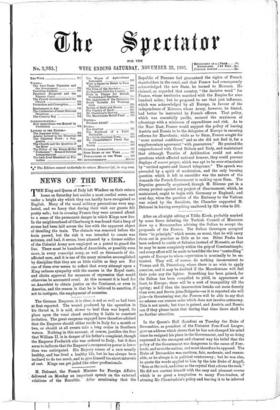M. Delcasse, the French Minister for Foreign Affairs, delivered on
Monday an important speech on the external . relations of the Republic. After mentioning that the
Republic of Panama had guaranteed the rights of French shareholders in the canal, and that France had consequently acknowledged the new State, he turned to Morocco. He claimed, as regarded that country, "the decisive word" for France, whose territories marched with the Empire for nine hundred miles ; but he proposed to use that just influence, which was acknowledged by all Europe, in favour of the independence of Morocco, whose Army, however, he hinted, had better be instructed by French officers. That policy, which was essentially pacific, secured the maximum of advantage with a minimum of expenditure and risk. As to the Near East, France would support the policy of leaving Austria and Russia to be the delegates of Europe in securing reforms for Macedonia, while as to Siam, France sought for "more mutual confidence," and as she did not find it, for a supplementary agreement" with guarantees." He praised the rapprochement with Great Britain and Italy, and maintained that although Treaties of Arbitration could not solve questions which affected national honour, they could prevent displays of amour propre, which was apt to be over-stimulated by "excited agents and biassed telegrams." The speech was pervaded by a spirit of moderation, and the only burning question which it left to smoulder was the nature of the demands the French Government is making upon Siam. The Deputies generally acquiesced, though M. Etienne put in a strong protest against any project of disarmament, which, he maintained, ought to begin with Germany or England; and next day, when the question of the Embassy to the Vatican was raised by the Socialists, the Chamber supported M. Delcasse in leaving everything unaltered by 324 votes to 231.


















































